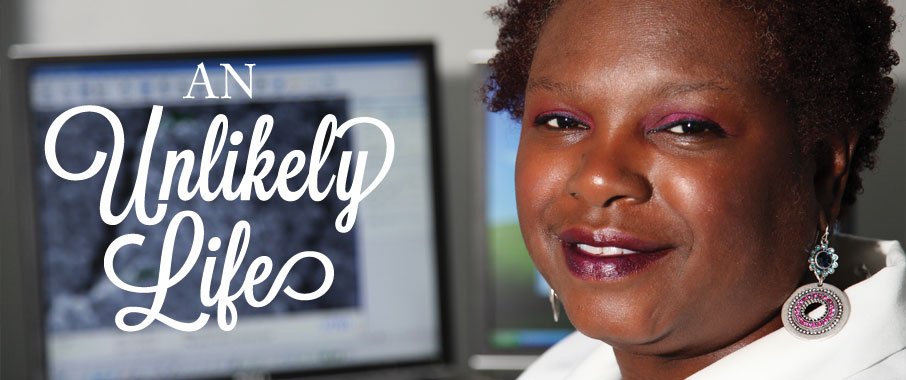


If Michou Kelley’s life seems remarkable, consider that it was never expected to happen at all.
Marie-Michelle “Michou” Kelley was born in New York City after her mother had left Haiti to provide a better life for her family. “My mother started having babies immediately after getting married. She had five in five years. Then she had seven miscarriages. I was never expected to happen. I was definitely an unexpected miracle. I’m 12 years younger than my nearest sibling.”
Now, on the brink of receiving her Ph.D. in biomedical engineering, Kelley, 49, is looking forward to the next phase of an unlikely life.
During a childhood in which she was routinely physically and emotionally abused, Kelley found an escape in school and dreams of an engineering career. “I was the classic engineering kid,” she explains. “I was forever taking things apart, and all I ever talked about was being an engineer and building things.”
That engineering career seemed attainable, even probable, when Kelley graduated from high school a year early at only 16. College ambitions were derailed however by the death of her godmother and mentor, Dounia or as she affectionately calls her Ninninn.
“She was my oasis in the desert,” recalls Kelley. “I was born at a time when there weren’t a lot of female engineers. And my mother came from a culture where women just didn’t become engineers. Dounia was my role model. She wanted to be an engineer when she was a girl and never had the opportunity. But she understood what I longed for. She encouraged me to find my passion and follow it. I was lost when she died of breast cancer.”
By 19, Kelley was married and had become a mother. For the next four years Kelley went to school off and on for engineering. In 1987 her life was run off track again when her husband abandoned her and their children. Rather than remain in engineering, Kelley knew she had to provide for herself and her children, so she went to San Antonio Community College to become an electronic technician, the closest thing to an electrical engineer she could be. After a few years of hard work, she tried to pick up where she left off with engineering and went back to UTSA in 1997. However, life had more curve balls in store for her, and she was forced to face the unexpected loss of her mother who also died of breast cancer. Once again, it seemed as though her dreams had been put on hold—but never stopped.
Though delayed more than 25 years, Kelley’s dream of a college education couldn’t be denied. She had overcome the loss of her mother and godmother, abandonment of her ex-husband, and struggled with being a single parent. Through it all she knew her dreams might be deferred but always attainable. After returning to UTSA in 2003, she persevered and received her bachelor’s degree in electrical engineering in 2006.
Immediately after graduation, she began pursuing her doctoral degree. Kelley’s focus shifted from electrical to biomedical engineering, as she sought to advance medical research. Then she went to Haiti and everything changed. Again.
“My sister and I went to Haiti as translators for a group of medical students working in a very remote area in 2008. This was before the earthquake in 2010, but even then, there was a desperate need for even the most basic medical necessities, things we take completely for granted.”
The change this time wasn’t a delay of study, or anything that could be visibly recognizable. Instead, the change was more of a spiritual awakening.
“When you’re younger you’re sort of chasing the career, trying to break through the glass ceiling and provide for your family. After my trip to Haiti, I began looking for fulfillment. I want to have an impact and change the world.”
Inspired by her tragic losses, Kelley’s doctoral research platform centered on metastatic breast cancer. Her Ph.D. dissertation addresses “Logical Enzyme-Triggered Layer-by-Layer Nanocapsules for Drug Delivery System.” In essence, she’s working on a way to increase the efficiency of chemotherapy treatment for cancer patients while minimizing its side effects.
“The normal way of administering chemotherapy is systemic,” Kelley explains. “It goes all over the body. Today, only .01 percent of the drug being administered gets to where it needs to go. So the technology I’m working on will make these nanoparticles recognize cancer cells and release the drug only to them. That will improve the efficacy of treatment and lessen the side effects of having the chemo drugs throughout the body when they only need to be delivered to certain cells.”
While her research may well have a global impact, Kelley believes she’s already made a mark on a smaller scale.
“My grandchildren have come to the lab with me, the same way my sons did. My grandchildren probably don’t realize it now, but someday, when they’re facing a challenge, they may look back and think, ‘Wait a minute, my Nana did what? If she can do that, I can do this.’
“I broke that cycle of abuse my mother and I experienced. My sons are loving fathers and their children see a lifetime of potential. I’ve already changed the world.”
—Randy Lankford